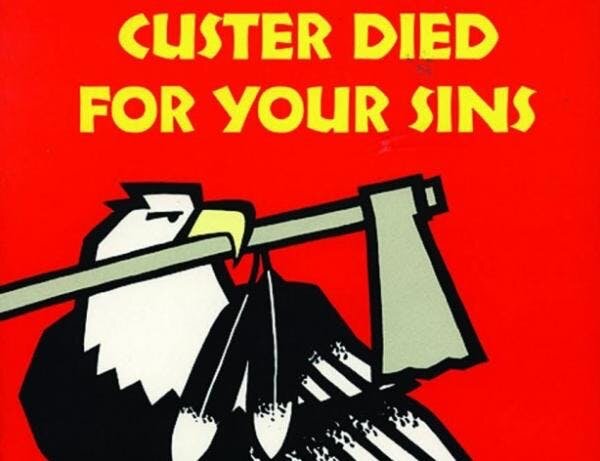By Vine Deloria Jr.
Custer Died for Your Sins: An Indian Manifesto, is a 1969, non-fiction book by the lawyer, professor and writer Vine Deloria, Jr. The book was noteworthy for its relevance to the Alcatraz-Red Power Movement and other activist organizations, such as the American Indian Movement, which was beginning to expand. Deloria's book encouraged better use of federal funds aimed at helping Native Americans. Vine Deloria, Jr. presents Native Americans in a humorous light, devoting an entire chapter to Native American humor. Custer Died for Your Sinswas significant in its presentation of Native Americans as a people who were able to retain their tribal society and morality, while existing in the modern world. (Wikipedia)
This excerpt from and article by David E. Wilkins in Indian Country Today can give you a feeling for this must-read:
He managed to articulate the concept in a way that made sense for Native peoples politically, legally, and perhaps most importantly, culturally. For Deloria knew that cultural integrity — Native lands, languages, values, and spiritual traditions — was the beating heart of Native sovereignty. And it was that integrity, fully acknowledged, if not always enforced, which was woven throughout the several hundred treaties and other diplomatic accords negotiated and ratified between tribal nations and the United States. His grasp of Native personal and political realities led prominent Pueblo scholar Alfonso Ortiz in a review in 1969 to deem Custer, “the most ambitious and most successful overview of contemporary American Indian affairs and aspirations I have ever read.”
The book’s publication in 1969 coincided with events, personalities, and social movements that were exploding across Indian Country and the United States. Americans in the midst of the Vietnam War knew about the Civil Rights Movement, the fight for women’s rights, the Stonewall riots, Johnson’s War on Poverty, Woodstock, and the Poor People’s Movement, but there was very little popular awareness of Native peoples. And a lot was happening within Indian Country, including the Fish Wars of Washington state led by Billy Frank and Hank Adams, the Alcatraz takeover, and the birth of the American Indian Movement in Minneapolis. Thus, the timing of Custer’s release, coupled with the force of Deloria’s trenchant observations rendered in his trademark sardonic prose, elevated the work and gave it real staying power.
Within the slim volume, Deloria skillfully and often humorously lambasted many of the entrenched myths and stereotypes about Indigenous peoples. He castigated powerful institutions. Anthropologists, with their discipline’s penchant for preying on and profiting from Indigenous communities were singled out. Christian churches were called out for their corrupt actions. The main target was the federal government with its multiple branches, departments, and agencies still devising far too many unprincipled laws and policies deployed with arrogance and disrespect towards Native communities.



